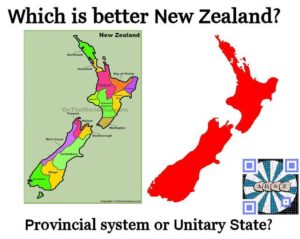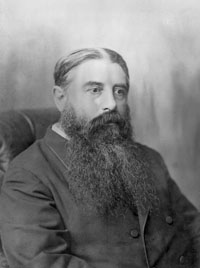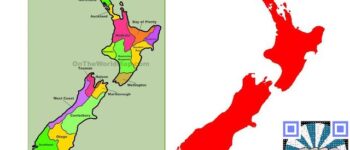1875: Abolition of Provinces
November 7, 2022
By AHNZ
 New Zealand’s Provincial System was broken up by Central Government using the Abolition of Provinces Act, 1875.
New Zealand’s Provincial System was broken up by Central Government using the Abolition of Provinces Act, 1875.
Since then the Unitary State has grown more and more influential. The Governor General was reduced to a figurehead, the Legislative Council “temporarily” abolished entirely. The Prime Minister and their Ministry have become supreme and I don’t think we are better off. Do you?
Bit by bit the Centralisation agenda has been taking over everything about New Zealand, absorbing anything local and distinctive into one great globalised and homogenised goo. When there is competition in administrators we can always pick someone else or signal that we will exit which prompts our political staff to pull their socks up. That can’t happen when we are all one big commune. All this amalgamation is also the next step in New Zealand itself being absorbed as part of a larger bloc.
When we had the provinces our capitals were places like Christchurch, Invercargill, Dunedin, Hokitika, Napier, New Plymouth, etc. and with their own Superintendents answerable to their local public. It wasn’t perfect but it was so much better than one Prime Minister out of Wellington calling the shots for everybody, all powerful.
Vote inflation is a great democratic problem that grows with our population. The more of us there are, the more our say is diluted down. In 1875 our population was 300,000 represented by 88 seats in the House of Representatives and a Legislative Council of 15 or so. By 1952 we had a population of 2 million with no provinces and no LC, bossed by 80 Members of Parliament but really just one Cabinet or one Prime Minister and their puppet Governor General ribbon-cutter functionary! In the 2020s our population exceeded 5 million and our individual power to have a voice is even more diluted while the power of a Prime Minister is even more concentrated.
Central power gets stronger with every birth or every immigrant just as yours gets weaker. One solution put in place by our ancestors was to have a small central government and to break New Zealand into provinces. Unfortunately that did not last.
“Big Government now had the power to oversee all of local New Zealand and the power to interfere ‘if required’. Stafford had neatly snatched power away from our Provinces, much to the frustration and rage of the Superintendents.” – 1858: Parliament Supreme, AHNZ
“The second section of the Constitution Act is hereby repealed, and the provinces of Auckland, Hawke’s Bay, Taranaki, Wellington, Nelson, Marlborough, Westland, Canterbury, and Otago shall be and are hereby abolished.” – Abolition of Provinces Act 1875, New Zealand Acts As Enacted, NZLII
“Suppose the State is composed of ten thousand citizens. The Sovereign can only be considered collectively and as a body; but each member, as being a subject, is regarded as an individual: thus the Sovereign is to the subject as ten thousand to one, i.e., each member of the State has as his share only a ten-thousandth part of the sovereign authority, although he is wholly under its control. If the people numbers a hundred thousand, the condition of the subject undergoes no change, and each equally is under the whole authority of the laws, while his vote, being reduced to a hundred-thousandth part, has ten times less influence in drawing them up. The subject therefore remaining always a unit, the relation between him and the Sovereign increases with the number of the citizens. From this it follows that, the larger the State, the less the liberty.” – J.J Rousseau, The Social Contract and the Discourses, Marxists.org
“…the first elections of members of County Councils were held within a few weeks of the date at which the Abolition of Provinces Act became law.” – ODT (1926,) Papers Past
“… a powerful central government presided over by a group of men known as The Continuous Ministry. They were a loose association of politicians who all batted for the same team, coming and going from an ongoing political project that held power from 1869 to 18901. These included Frederick Whitaker, Harry Atkinson, John Hall, William Fox, various Puppet Premiers, William Reeves, and in particular Julius Vogel.” – The Continuous Ministry, AHNZ
 As with many bad turns in New Zealand’s history the Abolition of Provinces was the work of the Vogel Gang (aka The Continuous Ministry.) The Premier at the time was Daniel Pollen but Harry Atkinson really ran things while Vogel was off in England organising to put our country deeper into debt to keep his schemes and scams going. Vogel had been a provincialist and many believed he would come home to New Zealand and put a stop to the Abolition. Instead, he flip-flopped. Maybe this expectation was fake and part of how the dirty job of abolition was achieved? A great spur to procrastinate about opposing the power grab.
As with many bad turns in New Zealand’s history the Abolition of Provinces was the work of the Vogel Gang (aka The Continuous Ministry.) The Premier at the time was Daniel Pollen but Harry Atkinson really ran things while Vogel was off in England organising to put our country deeper into debt to keep his schemes and scams going. Vogel had been a provincialist and many believed he would come home to New Zealand and put a stop to the Abolition. Instead, he flip-flopped. Maybe this expectation was fake and part of how the dirty job of abolition was achieved? A great spur to procrastinate about opposing the power grab.
Remember, the Abolition of Provinces was a huge constitutional change. It was a reform going up against the blueprint for the Colony and the law was passed without consulting the public and just in the last gasp as the Government’s term in power was expiring. It’s a reminder that New Zealand laws are changed by stealth not consent and that it has been this way all along; There were no ‘good old days’.
Some of the largest public meetings New Zealand had ever seen were organised to oppose the Abolition but it was no use.
A great trick to divert civic energy from restoring the old system was to have them tied up worrying about the next one. An expanded system of County Councils was set up with the first elections to be held about 4 weeks after the Abolition. This meant that everyone politically active had to get busy making sure they were winners in the newly set up system. To boycott it or shun it would mean not having any political power while those who get on board with the new game take it all. In participating in the Democratic New Deal it was being tacitly consented to. Having gained this County Council power the local politicians now had a vested interest in retaining it that grew every day. Who now would push for a counter-revolution to restore the provinces? The Vogel Gang were cunning.
George Grey, the famous old Governor, came out of retirement on a platform to restore the Provinces. What’s more, he won election and became Premier of the next Ministry. However, Grey did not make good his word. Instead he imported the idea of Liberal politics and branded Vogel’s Gang ‘Conservative.’ Grey was out for Grey and now branded himself a champion of the common man. Ref. 1877: George Grey, Premier, AHNZ
New Zealanders had given a mandate for their getting their provinces back but it was not to be. The country bore the country-town and nourished it with her best talent, country-towns became cities and ate up all the little towns; Amalgamation. Supercities ate sub-super cities; Municiple Darwinism.
Even the rulership in Wellington has become more concentrated as what was once a Responsible Government formed by Parliament has been taken over by political parties who can eject individuals who side with their voters rather than their party whips. They call this ‘integrity’ and call independent MPs ‘Waka Jumping’. Ref. 2018: Electoral (Integrity) Amendment Act, AHNZ
“We will add your biological and technological distinctiveness to our own. Your culture will adapt to service us. Resistance is futile.” – Borg, Star Trek
“It was a dark, blustery afternoon in spring, and the city of London was chasing a small mining town across the dried-out bed of the old North Sea.” ― Mortal Engines
Our State, that writes the history books, always tells its triumph in further centralising us in favorable terms. If I could write an Anarchist History of New Zealand and document the constant erosion of our independence and individual sovereignty toward increasing concentrated power in the hands of fewer and fewer politicians then maybe we would see what has been going on and stop it.
 Like Comment Share
Like Comment Share





